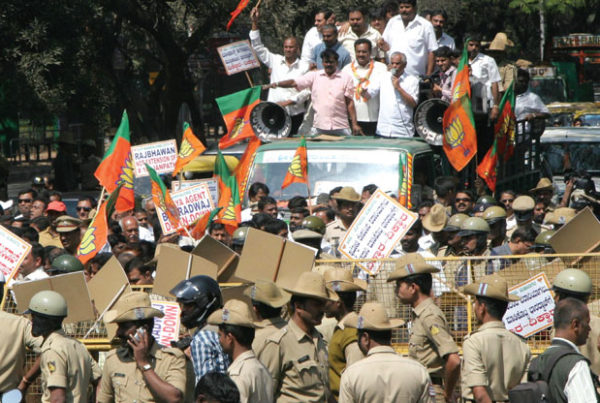In the doc: A column on documentaries
Film: The Nine Months
Director: Merajur Rahman Baruah

A Still From The Nine Months
IT IS A FRAIL Anupama Bhattacharjee who looks into the camera and introduces herself as the first female artist in Assam’s mobile theatre. The stage seems set for a nostalgic walk as she recounts her experience of sleeping on straw beds and being paid paltry sums. But several moments later a draft of resentment wafts in. The recognition is missing; she has not been accorded a place in history. And hence Bhattacharjee will claim that place for herself. She is a pathbreaker, she says, adding that by pushing against the barriers of social propriety (by entering the stage), she has made it possible for several young women to follow.
But consider the larger frame of Merajur Rahman Baruah’s film, The Nine Months, and we realise that Bhattacharjee’s resentment is not a misplaced one. Baruah’s film chronicles a movement that is as vibrant and alive as it is denied its share of recognition outside Assam. Mobile theatre, for the uninitiated, refers to a full-fledged theatre company — complete with actors, technicians, stage hands and even playwrights — that travels with its own sets, props and costumes. After a 45-day rigorous rehearsal, the companies travel to cities and villages across Assam. Typically, they present three or four plays in a season and performances are almost always booked in advance by local hosts.
Baruah’s film is a patient one, or at least a careful one. Just as the film accords the founder of Assam’s mobile theatre, Achyut Lahkar, space to recount his failure in the first year, there is space for a cook, a technician, a supporting actress to chime in with their own takes on life on the road. Memories and experiences aside, there are moments of pure incredulity as we watch an enterprising technical director recreate a set from James Cameron’s Titanic. Or when we listen to Sholay’s Gabbar Singh demand of Samba in chaste Assamese, kitne aadmi the?
At the end of 77 minutes, what we have from Baruah is a documentation of Assam’s neglected mobile theatre movement. Unfortunately, that is hardly enough to sustain interest. Produced by the India Foundation for Arts, the film stops short of just that — a film that could have gone beyond documentation.
—
This article was originally published in Tehelka, a leading independent news magazine in India, known for its investigative journalism.


